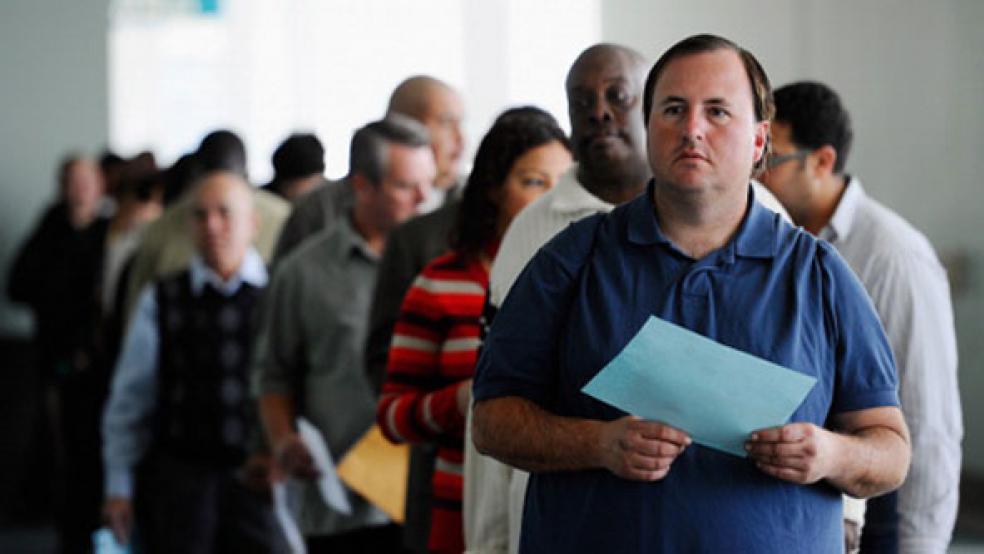More than a month after an extension of federal unemployment insurance expired for the long-term jobless, lawmakers still seem unable to come to agreement on how to treat those who cannot find work in a sluggish economic recovery.
Senate Majority Leader Harry Reid (D-NV), who in early January called extending unemployment benefits his top priority when Congress returned in the New Year, said Wednesday that the Senate would vote on a three-month extension next week. But whether such a proposal – significantly pared back from the Democrats’ originally proposed one-year extension – will even get a hearing in the House of Representatives remains unclear.
Republicans have insisted that the costs of any extension be offset by cuts elsewhere, but Senate negotiations on a three-month extension stalled out earlier this month due to differences on procedural rules. Meanwhile, experts say the U.S. economy is taking a hit because unemployment benefits are a form of stimulus, almost immediately poured back into the economy by recipients buying groceries, paying rent and taking care of the other necessities of life.
Related: Democrats Focus on Retirement Security
“There are now 1.6 million unemployed Americans cut off and 2.3 million children affected,” said Sarah Ayres, a policy analyst with the liberal Center for American Progress. “This money is going to people who are going to spend it – they’re putting it right back into the economy. This is really a self-inflicted economic wound.” The number of individual recipients whose benefits expire runs to about 70,000 a week.
In normal times, unemployment benefits – which are funded in large part by dedicated state and federal taxes – last for up to 26 weeks in most states. The purpose is to give people out of work through no fault of their own the time to look for a new job without becoming destitute. However, in times of widespread unemployment and economic stress, Congress has routinely extended the benefit beyond 26 weeks. During the Great Recession, benefits were extended to a maximum of 99 weeks in states with the highest unemployment and then, eventually, pared back to an upper limit of 73 weeks.
After allowing benefits to expire on December 28, Congress roared back into Washington at the beginning of January with promises that unemployment benefits would be at the top of the agenda. It was easy to see why. The Congressional Budget Office has estimated that a year-long extension of benefits to the long-term unemployed would add 0.2 percent to GDP growth in 2014 along with 200,000 jobs.
However, disagreement over whether and how to pay for such an extension has prevented a deal between Democrats and Republicans in the Senate. Meanwhile, in the Republican-controlled House of Representatives, where a significant element of the majority party is hostile to further extension, House Speaker John Boehner (R-OH) has indicated that he is content to wait until the Senate acts before bringing anything to the floor.
The result has been highly frustrating to those who advocate for the unemployed. Maurice Emsellem, director of the Access and Opportunity program at the National Employment Law Project said, “It’s really tough to figure out what’s going on with these negotiations and whether
anything is for real until it actually happens.”
Related: 6 Need-to-Know Insights About Unemployment Insurance
Economists aren’t much happier. Jared Bernstein, a senior fellow with the Center for American Progress, said that the disappearance of unemployment benefits has impacts beyond the direct effects on the recipient. “It hurts on the micro level, but it also hurts on the macro level,” he said, explaining that studies have repeatedly shown that recipients have a “high propensity” to spend the money they receive in benefits, boosting the overall economy.
Many Republican objections to an extension of unemployment benefits are rooted in the undisputed fact that the benefit is supposed to provide temporary relief. Many see their extension well beyond 26 weeks as unwarranted.
Bernstein points out, though, that historically, in times of widespread unemployment, benefits have regularly been extended until the level of long-term unemployed falls to around 1.5 percent. That figure is currently around 2.5 percent.
Top Reads from The Fiscal Times:




